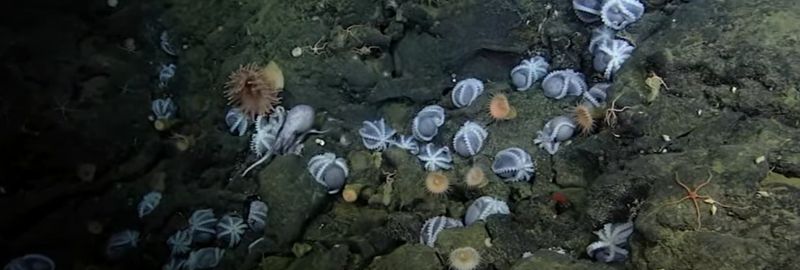
Angel Shark
Until fairly recently, scientists attempting to establish the existence, health, or migration of marine life had to use nets, cameras, or other means to identify and count the number of animals involved. Now researchers have a new and powerful tool, environmental DNA, or eDNA, a revolutionary technology that is helping scientists detect in real time the genetic information that animals leave in their wake.
Scientists have refined ways of extracting strands of genetic material from salt water, soil, and air. Depending on conditions, DNA can last for days in the ocean after an animal has shed it. Using small water samples collected at differing depths researchers can track where a specific species has swum, by checking DNA samples against reference databases.
Continue reading



 The headline on Cruise&Ferry.net reads “
The headline on Cruise&Ferry.net reads “ Over the weekend of August 26th and 27th, hundreds of volunteers gathered on the shores and on the waters of Loch Ness for what was billed as the largest search for the Loch Ness monster in 50 years. What was discovered during the “quest” weekend?
Over the weekend of August 26th and 27th, hundreds of volunteers gathered on the shores and on the waters of Loch Ness for what was billed as the largest search for the Loch Ness monster in 50 years. What was discovered during the “quest” weekend? The U.S. Department of Transportation’s Maritime Administration (MARAD) has awarded nearly
The U.S. Department of Transportation’s Maritime Administration (MARAD) has awarded nearly  Recently, Bertie Gregory, a National Geographic Explorer and host of Animals Up Close on Disney+, observed a remarkable attempt by two humpback whales to protect a seal under attack by a pod of orcas in Antarctica’s Weddell Sea.
Recently, Bertie Gregory, a National Geographic Explorer and host of Animals Up Close on Disney+, observed a remarkable attempt by two humpback whales to protect a seal under attack by a pod of orcas in Antarctica’s Weddell Sea. On August 13 2023, British endurance swimmer and environmental activist
On August 13 2023, British endurance swimmer and environmental activist 
 An updated repost. There is a line from a Paul Simon song, “these are the days of miracle and wonder.” One might not think to apply that lyric to the events of 9/11, 22 years ago today. Yet for at least part of that strange and horrible day, they fit.
An updated repost. There is a line from a Paul Simon song, “these are the days of miracle and wonder.” One might not think to apply that lyric to the events of 9/11, 22 years ago today. Yet for at least part of that strange and horrible day, they fit. North Korea has unveiled a
North Korea has unveiled a 

 We recently
We recently  We are saddened to learn that
We are saddened to learn that  Richard Starkey, better known as Ringo Star, wrote the song,
Richard Starkey, better known as Ringo Star, wrote the song,  In 2021,
In 2021,  The P&O cruise ship
The P&O cruise ship  We recently posted
We recently posted